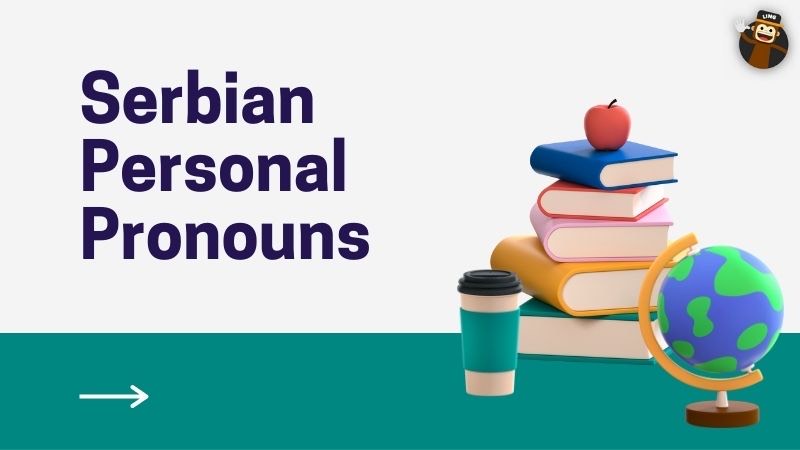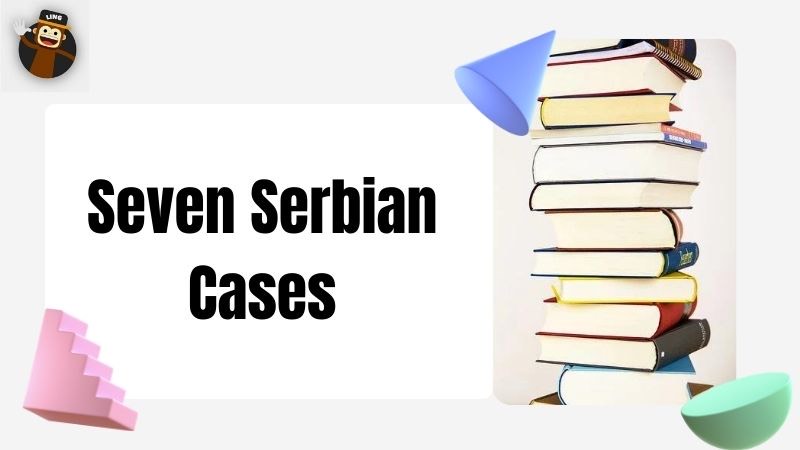If you are a native English speaker, then the Serbian language may seem quite tough to learn at first. Actually, the Serbian language is a part of the Slavic branch of Indo-European languages and is considered amongst the hardest languages to retain. Other Slavic languages include the Russian, Ukrainian, and Polish languages, which are equally fascinating and incredible to learn and speak.
Although challenging, with the knowledge of basic grammar, you can become a Slavic language expert within a few weeks with fluent speech. Serbian grammar is comprehensive and inclusive, with unique grammatical patterning for nouns, verbs, pronouns, and adjectives. If you plan to proceed with the learning journey, you are in the right place!
To become a knowledgeable Serbian speaker, learning its grammar is necessary. Nouns, pronouns, adjectives, and Serbian verbs, are the key aspects to grasp before starting a sentence or multiple word formations. Although the grammar is complex, making one go through the entire process of learning new alphabets, it is not entirely impossible to acquire it.
Here, we have prepared a few basic grammatical structures of the inflected Slavic literature to give you effortless access to becoming an eloquent speaker.
Serbian Nouns And Grammatical Gender
In Slavic language, the Serbian nouns are divided into three types, indicated by their normative case endings as “-i” type, “-a” type, or “-e” type, and all Serbian nouns belongs to one of the three grammatical genders existing in the Serbian language.
The three genders in Serbian are masculine, feminine, and neuter. Nouns of any three grammatical genders may be formulated with one of the three noun types. They may also represent the noun’s case, nominative, dative, genitive, accusative, vocative, locative, and instrumental in Serbian.
Masculine Gender Nouns
The masculine gender nouns in Serbian always end in consonants. But masculine nouns can also end in -o or -e. It is the case mostly with personal names.
Examples
| English | Serbian | Pronunciation |
| Men | мушкарци | Muškarac |
| Friend | пријатељу | Prijatelj |
| Soldier | војник | Vojnik |
| Teacher | учитељ | Lekar |
| Elephant | слон | Slon |
| Leader | Вођа | Voda |
| Lion | лав | Lav |
| Father | отац | Otac |
| Son | сине | Sin |
Feminine Gender Nouns
The Serbian feminine nouns generally end in a -a, unless proper noun endings are concerned.
| English | Serbian | Pronunciation |
| Woman | жена | žena |
| Cat | мачка | Mačka |
| Doll | лутка | Lutka |
| Grass | трава | Trava |
| Friend | пријателица | Prijatelica |
| Daughter | ћерка | ćerka |
| Bakery | пекара | Pekara |
| Lamp | лампа | Lampa |
| Notebook | свеска | Sveska |
Neuter Gender Nouns
When it comes to neuter gender nouns, the words always end with either -o or -e. Every other neuter noun follows the same word order.
| English | Serbian | Pronunciation |
| Child | дете | Dete |
| Field | поље | Polje |
| Feather | перо | Pero |
| Sea | море | More |
| Beer | пиво | Pivo |
| Time | време | Vreme |
| Tree | дрво | Drvo |
| Sun | сунце | sunce |
| Village | село | selo |
Determining A Noun’s Number
The inflectable word of a Serbian noun is further needed to represent a noun’s number. There are two grammatical number forms in the Serbian language, singular and plural forms. Three common constituents act as suffixes with these words for determining whether they are singular or plural. It is to note that many nouns in Serbian are usually formed only in the plural form.
The plural suffix -i is commonly used for the masculine gender, -e for the feminine, and -a for the neuter gender. To make it easier, memorize the rule that a feminine singular noun never ends in -o or -e, and a neuter singular noun never ends in a consonant or -a.
Masculine Plural Nouns
| English | Serbian | Pronunciation |
| Men | мушкарци | Muškarci |
| Lions | лавови | Lavovi |
| Fathers | очеви | Očevi |
| Sons | синови | Sinovi |
Feminine Plural Nouns
| English | Serbian | Pronunciation |
| Girls | девојке | Devojke |
| Women | Жене | Žene |
| Mothers | мајке | Majke |
| Lamps | лампе | Lampe |
Neuter Plural Nouns
| English | Serbian | Pronunciation |
| Children | деца | Deca |
| Fields | поља | Polja |
| Trees | дрвеће | Drveće |
| Beers | пива | Piva |
The next important element of Serbian grammar is the use of pronouns. Pronouns are used along with the same pattern and number morphology as nouns. However, unlike nouns, pronouns can be removed from a sentence or maybe dropped when it does not have a purpose. It implies that Serbian is a pro-drop language different from the usual order.
The Serbian pronouns have personal pronouns, indefinite pronouns, and relative pronouns. Here, we will discuss some basic personal pronouns and their three classifications that are a must to learning Serbian grammar. Personal pronouns refer to the person or the individual one is talking to, the person talking, or the person being talked about.
Nominative
| English | Serbian | Pronunciation |
| I | ја | Ja |
| You | ти | Ti |
| You (formal) | ви | Vi |
| She | она | Ona |
| He | он | On |
| We | ми | Mi |
| They | они | Oni |
Objective
| English | Serbian | Pronunciation |
| Me | ја | Ja |
| You | ти | Ti |
| Him | него | Nego |
| Her | њеној | Njenoj |
| Them | њих | Njih |
| Us | нас | Nas |
Possessive
| English | Serbian | Pronunciation |
| Mine | мој | Moj |
| Yours | твој | Tvoj |
| His | његов | Negov |
| Hers | њени | Njeni |
| Ours | наше | nše |
| Theirs | њихов | Njihov |
Basic Serbian Verbs
Learning verbs, both regular and irregular verbs, is a major prerequisite to owning up the fluency of Serbian sentence forming. Verbs are nothing but words that describe an action. In the Slavic branch, Slavic verbs have a property of aspect, the perfective and the imperfective. Here, the perfective expresses a complete action, and the imperfective denotes continuous or habitual action.
Further, the aspect compensates for the fact that Serbian verbs lack the essence of tenses compared to other languages. Serbian verbs have many tenses and unclear differences between the continuous and perfect tenses. However, a different set of conjugation takes place in Serbian verbs.
Conjugation is a verb change by grammatical categories. Serbian conjugation occurs in one future tense, one present tense, and four distinct past forms, perfect, artist, imperfect, and pluperfect. Let us now memorize some basic to-do verbs useful for constructing common sentences and complex words.
| English | Serbian | Pronunciation |
| To be | бити | Biti |
| To know | знати | Znati |
| To love | волети | Voleti |
| To give | дати | Dati |
| To want | желети | želeti |
| To eat | јести | Jesti |
| To work | радити | Raditi |
| To remember | запамтити | Zapamtiti |
| To end | на крај | Na kraj |
| To try | пробати | Probati |
| To forget | заборавити | Zaboraviti |
| To walk | Шетати | Šetati |
| To help | да помогне | Da pomogne |
| To like | свиђати се | Sviđati se |
| To die | да умре | Da umre |
It is to keep in mind that the gender of a noun directly affects the verbs in their past form. For instance, if a man is eating or working, the words raditi, and jesti will change accordingly to the gender, masculine or feminine.
Cases In Serbian Grammar
You cannot go to Serbia without learning the rich case structure of Slavic grammar. Cases have always been the challenging part of grammar, be it any language. As we begin with cases, it is important to know that they are just diverse forms of nouns, adjectives, and pronouns applied for varied purposes. Today, we will discuss some of the important Serbian cases.
There are in total seven cases for both singular and plural words, be it adjectives or nouns. Adjectives follow the noun in declension.
| Case | Answers query | Uses | Example |
| Normative case |
Who? or What? |
Expresses the initial structure of a word |
Krava pije vodu. ( The cow is drinking water.) |
| Genetive |
Of who? or Of what? |
Used for generally expressing one’s possession or a part of a particular thing |
Torba čoveka. (The bag of the man.) |
| Accusative |
-Whom? or What? |
Used to indicate the object of a sentence |
Razgovarali smo sa učiteljicom. (We talked with the teacher.) |
| Dative |
To whom? or To what? |
Expresses the person who is given something |
Radnicima je dala sendviče. (She gave sandwiches to the workers.) |
| Locative |
Where? or About whom? |
Expresses the location and is used with prepositions |
Priča je o kralju. (The story is about the king.) |
| Instrumental |
Using, with, what? or using, with, whom? |
Used to indicate the application of something to gain action |
Ona jede viljuškom. (She eating with a fork.) |
| Vocative | ———— |
Used to address or call someone |
Hej, dame! (Hey, ladies!) |
This blog post gave a fundamental review of Serbian literature’s grammar. To have mastery over it, you have to dig deeper and keep discovering further. If you are willing to go ahead, you can reach out to the Ling App by Simya Solutions and learn fascinating vocabulary and other words in Serbian in amusing ways.





































































